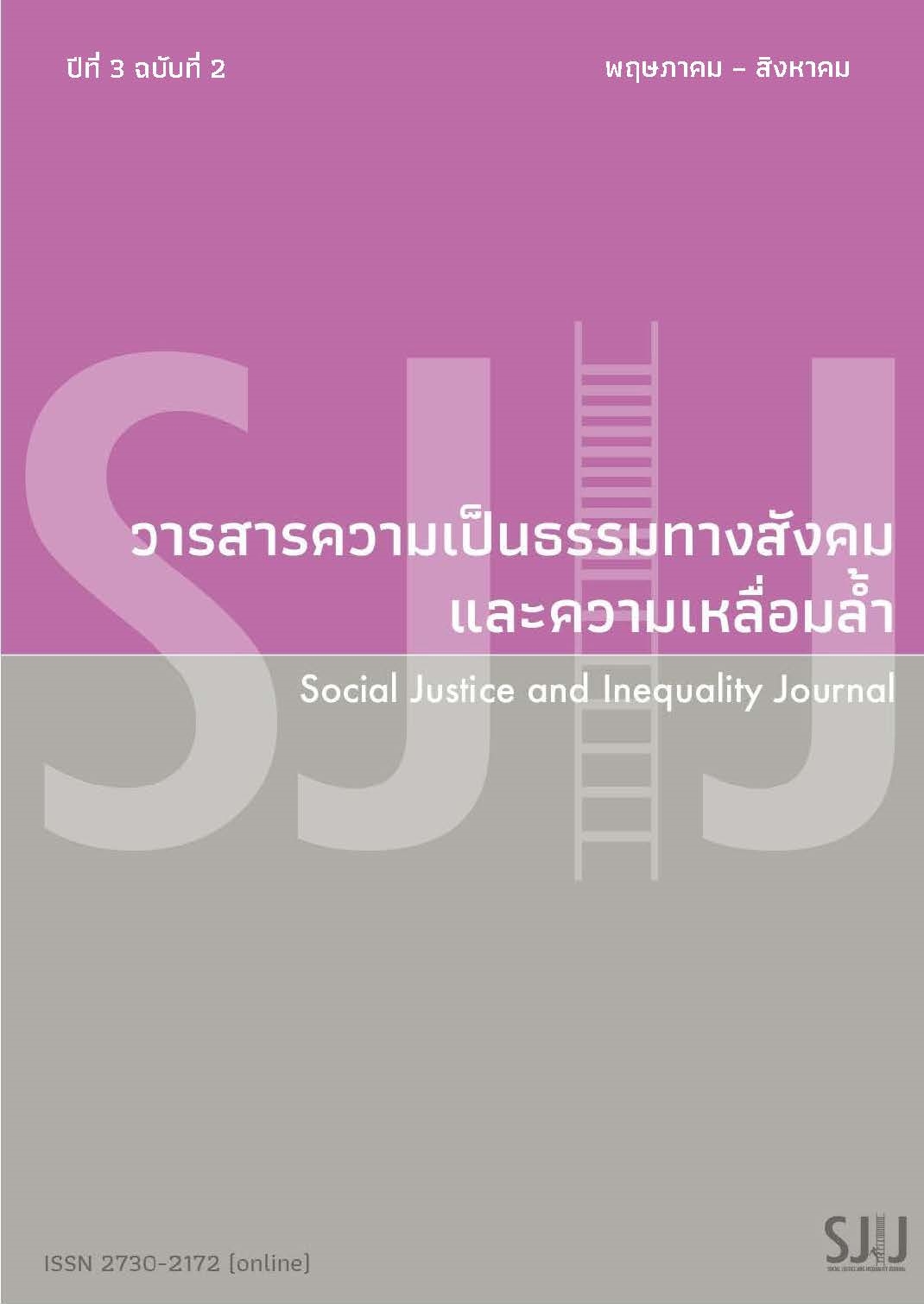Perceptions and reality of bargaining power among migrants in mobility-dependent sectors: The case of Cambodian migrants in fishery and construction
การรับรู้และความเป็นจริงของอํานาจต่อรองของแรงงานข้ามชาติในภาคส่วน ที่ต้องพึ่งพาการเคลื่อนย้าย: กรณีแรงงานข้ามชาติกัมพูชาในการประมง และการก่อสร้าง
Keywords:
Thailand, Cambodia, migration, precarity, Covid-19Abstract
This paper evaluates the rapidly evolving structural changes in Cambodian-Thai migration pathways to determine how long-term shifts in bargaining power favoring Cambodians intersect with the abrupt restrictions on mobility imposed by the Covid-19 pandemic. Thailand began encouraging inward labor migration to respond to gaps in the workforce during its recovery from the 1997 Asian financial crisis, and was supported passively by a willing and young labor market in Cambodia. Classical theories describe the ensuing process well: economic conditions in sending countries improved while the need for labor in Thailand increased, causing conditions to improve for inward migrants. However, more poorly characterized by classical migration theories has been the fluid ideas of mobility for workers arising from the liberalization of travel within Southeast Asia and regional integration processes within the ASEAN bloc. In this paper, we characterize migrants’ livelihoods in mobility-dependent sectors, namely fishery and construction sector, and how they have adjusted their aspirations and expectations to match structural shifts in demography and economic opportunity. We find that, until the Covid-19 pandemic began, the balance of bargaining power between migrants, brokers, and Thai companies was in favor of migrants, although many migrants did not realize their increasing leverage. The onset of the pandemic exposed a degree of precarity that has further buried notions of bargaining power that were incrementally developing among migrants.
References
Bylander, M. (2018). Migration Disruption: Crisis and Continuity in the Cambodian Mass Returns. International Migration Review, 52(4), 1130–1161. https://doi.org/10.1111/imre.12342
Bylander, M. (2019). Is Regular Migration Safer Migration? Insights from Thailand. Journal on Migration and Human Security, 7(1), 1–18.
Cassarino, J.-P. (2004). Theorising Return Migration: A revisited conceptual approach to return migrants (RSCAS No 2004/02). European University Institute.
Castles, S. (2003). Why migration policies fail. Ethnic and Racial Studies, 27(2), 205–227.
Castles, S., & Miller, M. J. (1998). The Age of Migration: International population movements in the modern world. Palgrave.
Chaisuparakul, S. (2015). Life and Community of Cambodian Migrant Workers in Thai Society. Journal of Population and Social Studies, 23(1), 1–16.
Constant, A., & Massey, D. S. (2002). Return Migration by German Guestworkers: Neoclassical versus New Economic Theories. International Migration, 40(4), 5–38.
de Haan, A. (1999). Livelihoods and poverty: The role of migration ‐ a critical review of the migration literature. The Journal of Development Studies, 36(2), 1–47. https://doi.org/10.1080/00220389908422619
de Haas, H. (2005). International Migration, Remittances and Development: Myths and facts. Third World Quarterly, 26(8), 1269–1284.
Ducanes, G. (2013). Labour shortages, foreign migrant recruitment and the portability of qualifications in East and South-East Asia. International Labor Organisation.
Dustmann, C., & Kirchkamp, O. (2002). The optimal migration duration and activity choice after re-migration. Journal of Development Economics, 67, 351–372.
Engblom, A., Lephilibert, N., & Baruah, N. (2020). COVID-19: Impact on migrant workers and country response in Thailand. International Labor Organisation.
Feurer, R., & Pearson, C. (2017). Against Labor: How U.S. Employers Organized to Defeat Union Activism. University of Illinois Press.
Harkins, B. (Ed.). (2019). Thailand Migration Report. United Nations Thematic Working Group on Migration in Thailan.
Harris, N. (1996). The New Untouchables: Immigration and the New World Worker. Penguin Press.
Human Rights Watch. (2018). Hidden Chains: Rights Abuses and Forced Labor in Thailand’s Fishing Industry.
Levitt, P. (1998). Forms of Transnational Community and their Implications for Immigrant Incorporation: Preliminary Findings. Conference on Integrating Immigrants in Liberal States.
Massey, D. S., Arango, J., Hugo, G., Kouaouci, A., Pellegrino, A., & Taylor, J. E. (1993). Worlds in Motion: Understanding International Migration at the End of the Millennium. Clarendon Press.
Nurick, R., & Hak, S. (2019). Transnational migration and the involuntary return of undocumented migrants across the Cambodian–Thai border. Journal of Ethnic and Migration Studies, 45(16), 3123–3140. https://doi.org/10.1080/1369183X.2018.1547024
Nyberg-Sørensen, N., Van Hear, N., & Engberg-Pedersen, P. (2002). The Migration-Development Nexus: Evidence and Policy Options. State-of-the-Art Overview. International Migration, 40(5), 4–43.
Olesen, H. (2002). Migration, Return, and Development: An Institutional Perspective. International Migration, 40(5), 125–149.
Razum, O., N. Sahin-Hodoglugil, N., & Polit, K. (2005). Health, Wealth or Family Ties? Why Turkish Work Migrants Return from Germany. Journal of Ethnic and Migration Studies, 31(4), 719–739.
Sciortino, G. (2000). Toward a political sociology of entry policies: Conceptual problems and theoretical proposals. Journal of Ethnic and Migration Studies, 26(2), 213–228.
Sjaastad, L. A. (1962). The Costs and Returns of Human Migration. Journal of Political Economy, 705, 80–93.
Stark, O. (1991). The Migration of Labor. Basil Blackwell.
Thai Ministry of Labour and Social Welfare. (2003). Statistical Data of Irregular Migrant Workers Registration. Office of the Administrative Commission on Irregular Migrant Worker, Department of Employment.
Zolberg, A. R., Suhrke, A., & Aguayo, S. (1989). Escape from Violence: Conflict and the refugee Crisis in the Developing World. Oxford University Press.
Downloads
Published
Issue
Section
License
Copyright (c) 2022 Social Justice and Inequality Journal

This work is licensed under a Creative Commons Attribution-NonCommercial-ShareAlike 4.0 International License.




